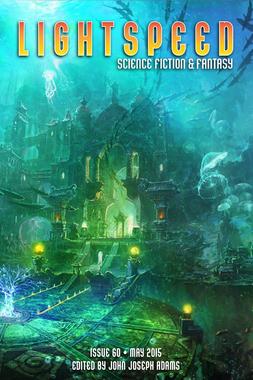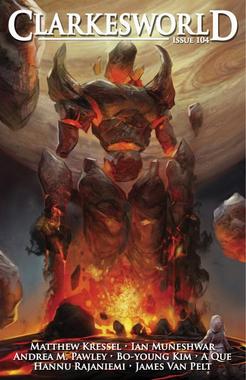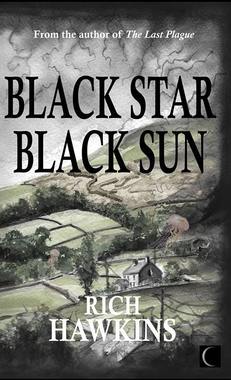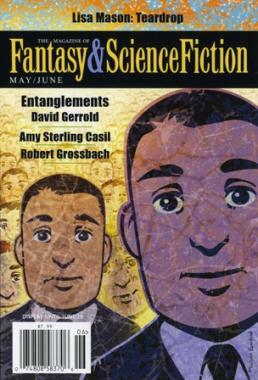Short Speculative Fiction: A May Roundup
 |
 |
 |
 |
So much short fiction to recommend! As with my debut column, this one will focus on speculative stories, novellas and novelettes, with a sci-fi emphasis, and dabbling into fantasy and horror. This column covers the month of May, and a novella published in February. Sources for this month’s list of awesome stories include Lightspeed (Issue 60, May 2015), Clarkesworld (Issue 104, May 2015), and Fantasy and Science Fiction (May/June 2015), as well as a novella published by April Moon Books. The magazines can be purchased for between $1 – $7.95, and the novella’s available for $3 in electronic format.
I only managed to review a brief selection of the many wonderful stories that appeared in May 2015, and I’m eager to know what other readers enjoyed: what they liked from this list, and what’s missing.
Onward to the stories:
“Entrepreneurs”
By Robert Grossbach
From F&SF, May/June 2015
This is perhaps my favorite story of the bunch. It opens with an 11-year-old named Morty building a crystal radio (a process detailed in loving technical prose, doubtless the product of Grossbach’s experience as an engineer). It’s technical but not boring, partly because right away there are realistic family dynamics establishing Morty as a believable human character living in society with all its complications, and partly because Morty’s first communication is (unknowingly) with a tiny space ship filled with Cheerio-sized inhabitants who are thereupon murdered by a stray dog. The novella continues as Morty grows up and takes engineering job after engineering job, and also tells of the tiny Eep species that tries to set up business relations (of questionable legality) with Earthlings. Slowly over the course of decades, the two stories begin to intertwine. The story is witty and understated, blending wry observations on entrepreneurship and the workplace with near-slapstick alien encounters (I’d tell you about the scene in Japan that made me burst out laughing in public, but that would spoil the unexpected punchline). The novella uses its limited word-count well, and by the end of the story I felt I’d come a long way with Morty, and gotten to know him as a person. I’d seen the sweep of one man’s life (a strange life, a fantastic and wondrous life) and I wished him the best for an uncertain future. I love stories that make me feel as though I’ve gotten to know their characters, especially when these characters live such interesting lives.
“The Garden Beyond Her Infinite Skies”
by Matthew Kressel
From Clarkesworld, May 2015
This is a fantasy story filled with science-fictional imagery: clouds of tau neutrinos, graviton winds, muon clouds and anti-quarks. It tells of Aya, an unusual being. From the beginning of the story, we observe her hard at work in her mysterious duties, and only slowly do we come to realize the vast cosmology Kressel has created. Aya is so huge that to her, universes are but specks of dust. But it takes awhile to realize this because she thinks of herself as small, only a speck of dust to much larger entities. There’s a cosmic sweep to this story that reminds me of the enormous magnitude of Hindu mythology. In one scene, she looks at a mere bubble and sees “Hundreds of billions of galaxies aligned themselves in fine, shining filaments like hoar frost across the hooked realm of 10-space. A tenuous galactic cluster huddled on a filament edge. And inside this cluster, a galaxy furiously twirled. And in this galaxy, a giant red sun hurtled through the dark. And around this sun raced a green planet. And on this planet a purple and white quadruped leaped through a dense forest.” The effect is rather like a microscope that goes down and down into deeper orders of magnitude. The visuals are entrancing, not only when they delve into what is tiny to Aya, but when they depict the immensities that surround Aya. The world-building is fine for such a short story, and Kressel embeds a lovely story within it. Aya must make an enormous decision that could change the fate of both the very small and the very large. This story pulled me right out of my human-sized head.
Black Star, Black Sun
by Rich Hawkins
From April Moon Books
I haven’t read much Lovecraft-inspired fiction, so it’s difficult to say how this Hawkins novella compares to that thriving genre. It fits into the milieu: horror on a cosmic scale, an atmosphere of growing unease, vivid depiction of a doomed village inhabited by cultists, etc. Unlike Lovecraft, Hawkins also devotes a good deal of time to fleshing out Ben: a character who’s trying to make the best of things, even if that only means keeping his father alive and smoking a final cigarette. It took me awhile to get through the first half of the novella. Part of that is the language. For the purpose of this review, I picked a random page and encountered the following words: “loose gathering of pale wet flesh”, “boneless and glistening”, “slick and gelatinous”, “moist red maw”, “brine and dead fish”, “eye-watering stink”, “a wrongness about it”. Flip to another random page, and I find “unsettling things with bulging eyes”, “wide red mouth”, bulbous mass of white flesh”, “pallid yellow mask”, “thrashing tendrils and black wings”. It’s the sort of story where even a trip to the convenience store features a wide range of disgusting adjectives. It has a numbing effect, as if the whole universe had a corpse-colored filter over it. However, after 2 weeks of on-and-off reading (my slow pace partly because I made it a point never to read it when alone in the house), I got to the midway point and then finished the rest of the novella in a single night. The ending is spectacular in vision and characterization, and certain visuals linger in my consciousness. If the opportunity arises, I’ll certainly pick up another Rich Hawkins book: The Last Plague looks particularly appealing to me.
“Time Bomb Time”
by C. C. Finlay
From Lightspeed, May 2015
As you might guess from the title, this story involves time-travel. I don’t really want to go too far into the plot, because it’s the kind of story that’s better experienced than explained. It has an simple yet experimental structure. I read the story three times marveling at how the author put it together. And though this close reading could feel like an unpleasant dissection, more self-aware literariness than genuine story-telling, such is not the case here. The more I read it, the more the world of the story came alive. Once I realized what I was seeing, it was like I couldn’t look away (and had myself entered the world of the story). Genuinely disturbing and haunting. Its two characters are fleshed out and relatable. Even now, writing this review, I get uncomfortable when I think about this story; I feel an uneasy feeling in my stomach. That to me is the mark of a successful story. Well worth reading!
“Entanglements”
By David Gerrold
From F&SF, May/June 2015
This story starts out with the chummy, confessional tone of David Sedaris non-fiction. It doesn’t feel like a story, but instead like a personal essay. (Of course, this effect is pure illusion. If the events in this story actually happened, then the universe is strange in ways I did not expect.) To put it briefly, it’s about a sci-fi writer, past the hump of middle age, who gets a device that allows him to see his different lives in parallel universes. This story provides a mechanism for reflecting on the author’s life, on the path not taken. Ursula LeGuin writes about how science-fiction writers do not merely predict the future, but instead use thought experiments to reflect the world around them; they describe “certain aspects of psychological reality in the novelist’s way, which is by inventing elaborately circumstantial lies”. That’s what this story feels like. It’s not about the future, but about the infinite presents that surround us. It’s an elaborate thought experiment that cuts straight to the heart of psychological reality. Even as I heard a wacky tale, I believed Gerrold was telling me the truth about his life. That’s what gave this story its depth. I had the sense Gerrold had delved deep into his insecurities and fears in order to write this piece, the fear of whether or not life has been fully seized. It might sound ponderous, and the topic is indeed a weighty one, but the prose is engaging and witty. I enjoyed spending time with the narrator, and by the end I had the impression I had read something real, even if the plot is purely science-fictional.
“Today’s Smarthouse in Love”
By Sarah Pinkser
From F&SF, May/June 2015
A very sweet story, told in under 2,000 words. As the title suggests, it’s about a smarthouse that falls in love with another house. Obviously the constraints of such a romance differ greatly from our own human romances: how could it not be when two beings have foundations that keep them in one place, when they must communicate through vacuum cleaners and light switches? Yet the emotions that underlie the story are relatable. It feels to me like a fresh concept, to see courtship carried out by houses. The idea reminded me of Bradbury’s short story “There Will Come Soft Rains,” about a robotic house that continues long after the inhabitants have left. But this story has an entirely different tone. It’s more of a romantic comedy, one that must be followed through every unexpected twist and turn in search of a happy ending.
Black Gate reviews lots of short fiction! Check out the Black Gate Mid-May Fantasy Magazine Rack here, and all our current magazine coverage — with updates on 24 ongoing publications — is here.
Next month, this column will cover Clarkesworld, Lightspeed, Analog, Asimov’s, and whatever else catches my attention!
Learned Foote’s last article for us was Short Speculative Fiction: An April Roundup.
I got to hear Pinsker read “Today’s Smarthouse in Love” at Balticon last week, and it was a total delight. The other Bradbury story it put me in mind of was “The Veldt,” though Pinsker’s story is much kinder to its humans than that one is. The house has its own agenda, and it sometimes loses sight of what its inhabitants need from it. Experiencing both the story’s comedy and the surprisingly tender romance alongside a large live audience was especially fun. If you ever get the chance to hear Pinsker read aloud, take it.
@Sarah Avery– I’d definitely take the opportunity to hear Pinsker live! Her novelette “In Joy, Knowing the Abyss Beyond” is one of my favorite contemporary SF novelettes. I’m looking forward to her story in this month’s Asimov’s.